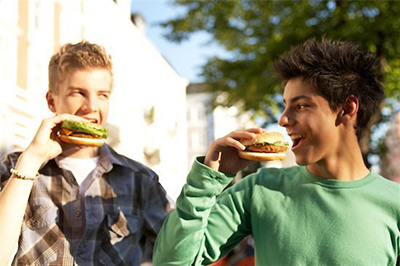IF YOU PREFER SUSHI TO PIZZA,ORGANIC food to processed, or vegetables to meat, you’re in luck. Long gone are the campus dining days of your parents’ generation, the one-meal-fits-all cafeteria-style food (Meatloaf, anyone?). Like restaurants, grocery stores and food chains, college campuses have responded to the country’s current food trends and more conscious eating habits.
MORE CHOICES
One thing’s for sure—when it comes to eating on campus, you have options: from more standard cafeterias to food-court-style dining to grab-and-go convenience stores. But more important are the choices you’ll have once you sit down to eat!
Schools have broadened their dining offerings to suit pretty much everyone, incorporating vegetarian and vegan options, kosher and ethnic food, franchise fast food and, as always, Starbucks. Colleges also accommodate dietary restrictions and food allergies.
For example, the dining program at UCLA offers healthier choices like whole grains, locally grown foods, organic options and fewer trans fats. At the University of Miami, you can choose from sushi, Hispanic-Caribbean food or a glatt-kosher deli, among other offerings. And in the food court at Nova Southeastern University (FL), choices include Papa John’s Pizza, Einstein Bros. Bagels and Subway. The school even supplies fresh fruit vending machines.
In addition, dining services departments are starting to provide coffee shops—where students can study—in libraries and other areas on campus.
ON-THE-GO AND 24/7
The grab-and-go market on college campuses continues to grow, providing students with wrapped sandwiches, fruit, snacks and other easy-to-transport meals.
New this year at Virginia Tech is the “YES to Go” program, created in response to requests from students for healthier grab-and-go options. Now, 21 new food items have fewer than 600 calories and contain heart-healthy fats. Students can also speak one-on-one with the college’s dietitian about their nutritional needs.
Another big change: Food is available on most campuses 24/7, instead of the limited dining hours that many cafeterias used to adhere to.
BETTER FOR THE ENVIRONMENT
Over the last few years, campus cafeterias at Colby College, Harvard University, Middlebury College and the University of Oregon, among other schools, have implemented “trayless dining.” Hundreds of colleges have removed trays from their dining halls, allowing students to eat what they can carry. The result has been a 20 to 50 percent reduction in food and beverage waste—great news for the environment.
Many schools also encourage ethical dining habits, supplying hormone-free meat, cage-free eggs and safely caught fish. Berkeley College boasts the country’s first certified-organic college dining hall. Others manage organic farms on campus, such as Cal Poly, College of Marin (CA), Dartmouth College and Pomona College (CA). Evergreen State College (WA) donates unfinished food to the local food bank, and scraps are composted.
However, for those of you envisioning late-night pizza deliveries, don’t worry: pizza, hamburgers and french fries remain a constant component of college life. You may have more options than yesterday’s college students, but some things never change!



